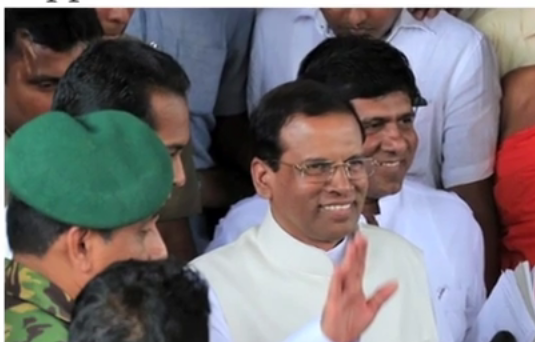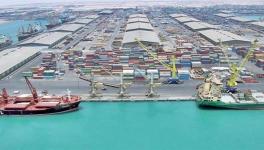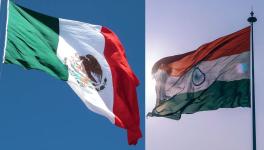Why did Rajapaksa Lose? – An Analysis of the Sri Lankan Election Results
Newsclick spoke to Srinivas Ramani about the recently held elections in Sri Lanka which saw the ouster of Mahinda Rajapaksa and the election of Maithripala Sirisena as President. According to Ramani, a combination of circumstances resulted in the victory of Sirisena despite Rajapaksa’s vigorous attempts to capitalize on the government’s victory in the civil war with the LTTE. Increasing centralization of power, cornering of positions and privileges by Rajapaksa’s family, growing militarization of the economy, erosion of democratic freedoms, and inability to reign in chauvinistic attacks on minorities, caused disaffection amongst large sections of the Sri Lankan people including the Sinhala population. The authoritarian and dynastic nature of Rajapaksa’s rule bred discontent within the old guard of the ruling Sri Lanka Freedom Party (SLFP). Led by Chandrika Kumaratunga, this section put its weight behind Sirisena, a move that enabled it to rally a number of opposition parties including the Tamil National Alliance (TNA). Ramani believes that the regime change could be significant in many ways. Firstly, the presence of the TNA in the national mandate could be conducive to resolving the question of Tamil regional autonomy. On the economic front, the appointment of Ranil Wickremesinghe as the Prime Minister could signal a deepening of neo-liberal reforms. Finally, at the level of foreign policy, Rajapaksa’s exit could herald a distancing from China and a rapprochement with India and the western powers.

Rough Transcript
Prabir Purkayastha (PP): Hello and welcome to Newsclick. Today we have with us Srinivasan Ramani from Economic and Political Weekly to discuss the recent election results in Srilanka. Srini, the election results have been a little unexpected. So what do you think has happened to make this possible?
Srinivasan Ramani (SR): It was a very unique conjecture. What happened was till about one month ago nobody expected the coalition that Rajapakshe had built after winning the civil war would fray away so quickly. What happened was SLFP, the Srilankan Freedom Party to which the Rajapakshe belonged to, the old guard of SLFP was getting disenchanted with the concentration of power within the Rajapakshe family and they actually identified the right moment to stage some kind of an internal coup with the SLFP and pitched the Maithripala Sirisena for the candidature of the Presidency. Maithripala Sirisena's nomination got actually the opposition together and created the coalition of the forces as strong as what Rajapakse has built in 2010. So this confluence of forces at the right moment actually helped to build sufficiently good opposition to the Rajapakshe and turned out victory for Maithripala Sirisena.
PP: In essence, the Sinhala politics that has propounded in quite some time which was anti Tamil and which was also anti Muslim we have certain attacks which have been taken place for a couple of years. So that is one element which of course forced these forces to vote for Sirisena but the other part is the Sinhala majority has really split though Rajapaksha has taken a lead not a very significant one in the Sinhala area but it has obviously split. So you said that Rajapksha was really the reason for the split as you talked about the family. Can you give us some example what he did with the Srilankan government and the family.
SR: After winning elections in 2010 and after winning the civil war the expectation was that Rajapakshe would be liberal enough to devolve power to some extent. Also would release some of the causes which were concentrated in the Presidency. There was talk that the executive presidency would be slowly weakened and Parliamentary system would be strengthened. Instead, the reverse happened. What Rajapakshe did was strengthen the executive Presidency even further. He actually moved 18th amendment of the constitution which concentrated even more power to the executive Presidency. He removed two term limits on the executive Presidency and also created a system of patronage wherein the government was concentrated in the hands of his own family members. For example, his younger brother Basil Rajapakshe was given economic reconstruction ministry. The defence ministry was given to Gothabaya Rajapakshe. His elder brother was the speaker. His son was being promoted at SLFP. Almost, 70 to 80 members of the Rajapakshe family were given important post in the bureaucracy in the government. All these actually got a number of people in the SLFP old guard be disenchanted and they felt that this was actually leading Srilankan politics into what was happening in Pakistan for example military dominated and authoritarian Presidency. So this was not seen well within the SLFP and Chandrika Kumaratunga who has actually given active politics actually came back to politics and actually orchestrated this internal coup in some sense so that actually resulted in the split in the Sinhala majority.
PP: She is from SLFP, the same party. She was President from the SLFP. There are two elements in what you have said. One is an imperial Presidency as it were which was dynastic in nature. The second of course is the importance of the military and building a military industrial complex which would also be under the control of the Rajapakshe family and be in the economic centre of the power and so in that in that sense not just corruption but also a structural change in the Srilankan economy in which military would play an important role.
SR: There is a reason why military became dominant after winning the civil war. The victory in the civil war was made possible because a large section of the rural peasantry in the Srilanka especially in the Southern parts of Srilanka were recruited into the army and they were used in the war against the LTTE and after the war got over, the military got involved in the various economic activities as well. This was a way to keep placating the Sinhala rural peasantry and keep them employed and in a post war situation when there was an economic crisis this was a one way to provide employment to the rural peasantry. That was one structural reason for what the Rajapakshe regime did. Apart from that, Rajapakshe regime in order to strengthen its power also wanted to militarise not just economy, also militarised the polity to a great extent. The free press was curtailed. All kinds of authoritarian rules and activities were endangered during this period. As you said a military, industrial complex was built in these last five years. It was a product of civil war in some sense. At the same time, it was also instrumental in consolidating power under Rajapakshe. Now, Rajapakshe probably felt that the victory of civil war are still fresh and he called elections two years before the scheduled time but it actually backfired against him. Ultimately, there was a section among Sinhala majority population which was disenchanted with the concentration of powers.
PP: The other part of it for which not much comment has been made is the UNP Ranil Wickremasinghe becoming the Prime Minister. Now, he has been also identified as one of the architects of neo liberalism in Srilanka and while Rajapakshe has been also a part of capitlist concentration. But there is a certain degree of independence in terms of SLFP has always stood for. So it has been a combination of this Srilankan Sinhala nationalism, Sinhala Chauvanism, if you will which is anti Tamil and anti Muslim in its current phase and even earlier and also being nationalist in the Srilankan sense of term. While Vikramasingha and UNP represented always “liberal values” but also much more pro-rich and pro-west. So do you think with the alliance of Vikramasinghe and Sirisena is a change in terms of its foreign policy and economic policy will be.
SR: Economic Policy I don't see much of a change but actually it is other way round. SLFC in some sense adopted the policies that the UNFP had come up in late 1970s. What we saw in the last five years was major financialisation of the economy, true move towards neo-liberalism. Of course, military playing an important role in the economy but, Srilankan economy being dependent on China in particular indebted to Chinese aid and Chinese investment and so on. So, I don't see much of the change going to happen in the next few years but in foreign policy one important change that is going to happen is that the Srilankan ruling classes are slightly worried about the pro China tilt because relationship with India has always been important Srilankan ruling class irrespective to it's neo-liberal or populist character. Relationship with India has always been important. So this protracted tilt to China that was made during Rajapakshe regime there are reasons for that. International community was putting pressure on Rajapakshe regime for war crimes therefore, he has to orchestrate a foreign policy pro-China approach and he realized that China plays an importnt role in the international geo-politics and therfore China could protect Srilankan regime from international censure. So that was the reason for pro- approach and tilt. But these forces, Tamils in particular require an Indian support for their cause. Not necessarily Elam cause is not there now at least for a federal cause, India has to play a role over there and I think Sinhala ruling classes that these over dependence on China is not something that going to be good for them in the long run.
PP: But also, United States and West as a consequences also with the financial institutions of the West as a consequence because Srilanka could play a certain degree of a game as it were Chinese also provide aid, they also have financial clout so therefore, that is something which they were getting frozen out under what you pointed out. So some rapprochement with India and also with the West that is the other part of it. So in that sense going old UNP route this has been always UNP not the India part but certainly the Western route has been always UNP's part. The past point that I would like to take up with you is a question of Srilankan Tamils. Now, they have about nine percent of the population and they voted amass for Sirisena. They have also not made any demands regarding devolution of power and so on. So devolution of power that has been in the air Rajapaksha never conceded. Do you think that is more likely to happen under Sirisena?
SR: We have to wait and see on that but one thing that is going to be beneficial for the Tamil ruling party I mean the Tamil National Alliance is that in the previous elections, the local elections that were held in the Srilanka, almost the entire country, SLFP was the victor except for the Northern province where the TNA was victorious. This was not a good conjecture for them because ultimately the budgets and the fiscal spending were decided by the centre there and there are virtually powers that the governor enjoyed. So having an antagonistic President almost tied the hands of the government in the Northern Province. Now, because they have some say whether the say will be decisive or not is another matter which remains to be seen because they have voted for the Sirisena and therefore they have a presence in the mandate and they are not going to be dependent on the goodwill of the President but rather the mandate that they have possibly this could lead to a greater devolution of fiscal resources for the time being because the Indian aid to the Northern Province was more than the budget given to the Northern Province by the Srilankan Centre for the last couple of years. Now that kind of situation might change now. Whether devolution of power will happen or not will depend upon how long this conjecture lasts wherein you have the Tamils, the Muslims and a section of Sinhala majority coming together to vote out authoritarianism whether this conjecture will last some more time may be if people like progressive leaders like Chandrika Kumartunga play an important role who realize that the devolution of power is more important and national question is still not resolved in Srilanka. If these forces actually have a say in the longer run may be devolution can happen. But all said and done, the change of power actually holds well for the Tamils rather than the status quo I mean if the status quo persisted if Rajapakshe was still in power. That was not a particularly congenial situation for them.
PP: That is always the reason why the Tamils have voted against Rajapaksha and also the Muslims who were attacked by this Budh Bala Sena and so on has also voted for the opposition in this case Sirisena because they felt Rajapakshe was really extending his patronage to anti Tamil and anti Muslim forces. Thank you very much Srini, we will keep on watching Srilanka and we will keep on watching Srilanka with you.
SR: Thank you so much.
Get the latest reports & analysis with people's perspective on Protests, movements & deep analytical videos, discussions of the current affairs in your Telegram app. Subscribe to NewsClick's Telegram channel & get Real-Time updates on stories, as they get published on our website.
























